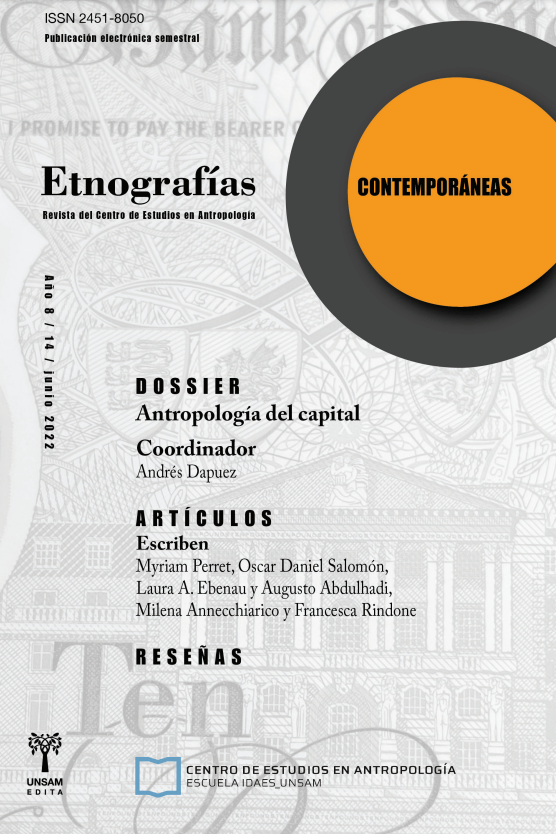Futures, subjects and networks
An Inquiry into the investor’s role in valuation and investment processes of startup projects
Keywords:
valuation, future, entrepreneurship, investment, risk, performanceAbstract
This article presents preliminary data of fieldwork carried out in the frame of a broader research project on the process of capital investment in startup projects. Within the economic and non-economic factors that appear when analyzing projects, there is a common denominator for all of them: the problem of the future. This “future” includes a double dimension, on the one hand, it involves an imaginary about the future world and, on the other, an ideal of self-transformation embodied in the investor. The imaginary future speculates on the process of value formation, turning uncertainty into calculated risks. In this speculation, aspects of a moral and ideological nature are involved and intervene to define what is a probable future and what is a desirable one. The uncertainty about the future, the expectations about it, and the definition of which are the most similar projects take place within the framework of interpersonal networks where the ideas and projects that circulate depend strongly on the links and institutional belongings of their members. This article accounts for the ways in which capital produces subjectivities and “futures”, within the framework of the debate of valuation studies and performance studies in economics.
References
Appadurai, Arjun, ed. (2013). The Social Life of Things: Commodities in Cultural Perspective. 11. print. Cambridge. Cambridge University Press.
Austin, J. L, and J. L Austin (1970). Cómo hacer cosas con palabras: palabras y acciones. Barcelona, Ediciones Paidós.
Beckert, Jens (2016). Imagined Futures: Fictional Expectations and Capitalist Dynamics. Cambridge, Harvard University Press.
Boussard, Valérie, Olivier Godechot, and Nicolas Woloszko (2019). “How to Make a Deal: The Role of Rankings and Personal Ties in Creating Trust in the Mergers and Acquisitions Market”. Socio-Economic Review 17(2), pp. 311–336.
Buccellato, Marcos (2021). El Arte Suave. Etnografía Del Brazilian Jiu Jitsu. Colección Miradas Antropológicas. Argentina, Prometeo Editorial.
Callon, Michel (2020). “What Does It Mean to Say That Economics Is Performative?” En Do Economists Make Markets?: On the Performativity of Economics. Donald MacKenzie, Fabian Muniesa, and Lucia Siu, eds. Pp. 311–357. Princeton University Press. https://doi.org/10.1515/9780691214665-013.
Doganova, Liliana, Martin Girardeau, Claes-Fredrik Helgesson, et al., eds. (2020). “Towards a Reformulation”, Valuation Studies Vol 7 Num 1(1)pp.1-2..
Fourcade, Marion (2011). Cents and Sensibility: Economic Valuation and the Nature of “Nature.” American Journal of Sociology 116(6): 1721–77.
Helgesson, Claes-Fredrik, and Fabian Muniesa (2013). For What It’s Worth: An Introduction to Valuation Studies. Valuation Studies 1(1): 1–10.
Knight, Frank (1921). Risk, Uncertainty and Profit. Cambridge, Mass: The Riverside Press.
Knorr-Cetina, Karin (2007). “Global Markets as Global Conversations”. Text & Talk 27(5–6). https://www.degruyter.com/view/j/text.2007.27.issue-5-6/text.2007.032/text.2007.032.xml, accessed January 1, 2018.
Malinowski, Bronislaw (1986). Los Argonautas Del Pacifico Occidental. Barcelona (España): PLANETA-AGOSTINI.
Mauss, Marcel (2011). Ensayo Sobre El Don. Forma y Función Del Intercambio En Las Sociedades Arcaicas. Buenos Aires (Argentina): Katz Barpal Editores S.L.
Muniesa, Fabian (2014). The Provoked Economy: Economic Reality and the Performative Turn. 1st edition. Routledge. https://www.taylorfrancis.com/books/9781135089955, accessed August 20, 2020.
Muniesa, Fabian, Liliana Doganova, Horacio Ortiz, et al (2017). Capitalization: A Cultural Guide. Sciences Sociales. Paris: Mines ParisTech.
Ortiz, Horacio (2013). “Financial Value: Economic, Moral, Political, Global.”HAU: Journal of Ethnographic Theory 3(1): 64–79.
Peebles, Gustav (2015). “Exchange in Anthropology.” In InternationalEncyclopedia of the Social & Behavioral Sciences Pp. 476–481. Elsevier. https://linkinghub.elsevier.com/retrieve/pii/B9780080970868120690, accessed August 20, 2020.
RAE, N.d. Diccionario de la lengua española. 23 edición. Diccionario de la lengua española. 23 edición. 23.4 en línea. https://dle.rae.es/, accessed October 30, 2021.
Sahlins, Marshall David (1972). Stone Age Economics. Chicago: Aldine-Atherton.
Weiner, Annette B. (1992). Inalienable Possessions: The Paradox of Keeping- While-Giving. Berkeley: University of California Press.
Wilkis, Ariel (2018). The Moral Power of Money: Morality and Economy in the Life of the Poor. Culture and Economic Life. Stanford, California: Stanford University Press.
Wilkis, Ariel, and Pablo J. Figueiro (2019). “Valuaciones monetarias y jerarquías sociales: evidencias empíricas y desarrollos conceptuales.” Estudios Sociológicos de El Colegio de México 38(112). https://estudiossociologicos.colmex.mx/index.php/es/article/view/1817, accessed October 8, 2020.
Zelizer, Viviana A. Rotman, and María Julia de Ruschi (2013). El significado social del dinero. Buenos Aires: Fondo de Cultura Económica.
van der Zwan, Natascha (2014). Making Sense of Financialization. Socio-Economic Review 12(1): 99–129.
























